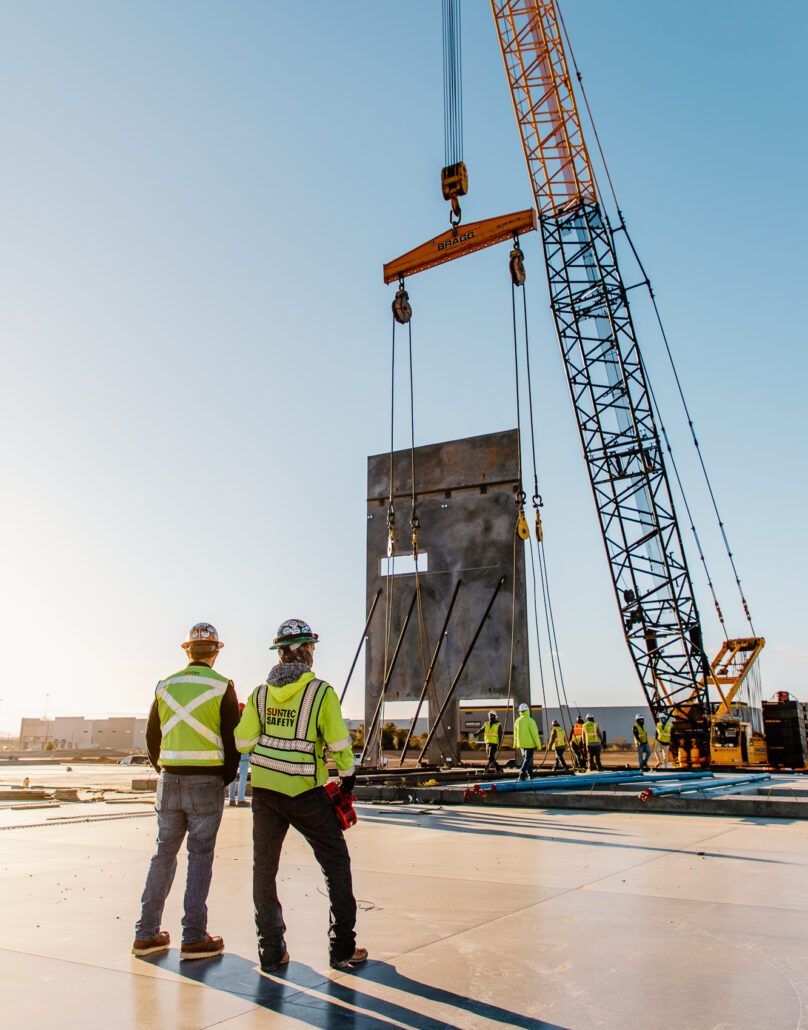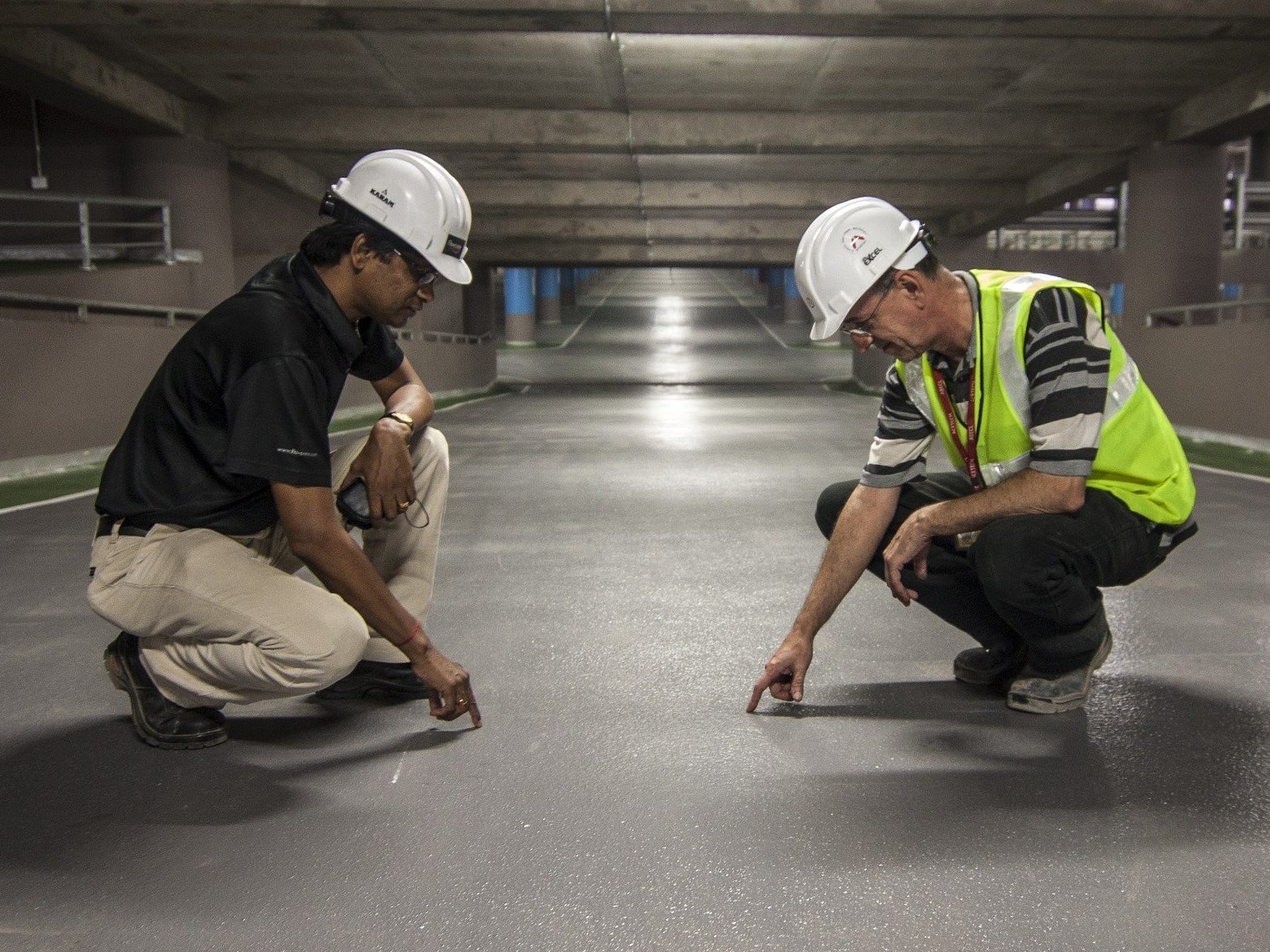WCGE commercial concrete: Ways to Balance Aesthetics, Strength, and Cost in One Project
WCGE commercial concrete: Ways to Balance Aesthetics, Strength, and Cost in One Project
Blog Article
The Crucial Role of Concrete Structure in Structural Stability and Durability
When it comes to constructing a residential or commercial property, the foundation is a lot more crucial than you could believe. Concrete foundations give unequaled stamina and durability, guaranteeing your framework can withstand different environmental difficulties. Without a solid base, you risk potential concerns like shifting or cracking, which can jeopardize safety and security and worth. Recognizing the nuances of concrete structures can be the secret to preserving your investment for several years ahead. So, what should you take into consideration following?
Understanding the Relevance of Concrete Foundations
Concrete structures are crucial to the total security of any framework, as they supply the essential assistance needed to hold up against various tons and environmental problems. When you think of constructing a home or a business area, the foundation is the first thing you need to consider. It serves as an obstacle versus dampness, safeguarding your property from water damage. A well-placed concrete structure additionally protects against settling and moving, which can bring about fractures in walls and floors. You'll intend to guarantee that the foundation is properly developed and strengthened, as this affects the long life of your building. In addition, a solid structure can enhance power performance by reducing air leaks. Keep in mind, ignoring the significance of a concrete foundation can bring about pricey fixings down the line. So, investing in a top quality structure upfront is vital for the stability and toughness of your framework.
Benefits of Concrete Foundations for Architectural Honesty
While lots of elements add to a structure's architectural honesty, concrete structures use unparalleled resilience and stamina. You'll appreciate that concrete can withstand severe weather, standing up to both wetness and temperature changes. This resilience implies your structure is much less likely to experience fracturing or moving over time, which can compromise its safety.Additionally, concrete's integral weight provides a strong base, avoiding motion during all-natural events like quakes or floods. When you choose a concrete structure, you're additionally selecting low upkeep; unlike timber, it won't rot or attract parasites, saving you money and time in repairs.Moreover, concrete's fire resistance offers included security, ensuring your framework can sustain heats without considerable damages. Overall, spending in a concrete foundation suggests you're prioritizing the long-term security and stability of your building, making it a wise selection for any type of building task.
Common Kinds Of Concrete Foundations
When it pertains to building structures, understanding the usual kinds of concrete foundations can assist you make educated choices for your job. The most prevalent types include slab-on-grade, crawl area, and complete basement foundations.A slab-on-grade foundation is a simple, economical option, where a thick concrete slab is poured straight on the ground. This kind functions well in cozy environments, as it lessens warmth loss.Crawl space structures elevate the home a little over ground, permitting ventilation and access to plumbing and electric systems. This style can aid protect against dampness issues.Full cellar structures use extra living or storage area while providing outstanding architectural support. They call for more excavation and are commonly used in cooler climates to avoid frost heave.
Aspects to Take Into Consideration When Designing a Concrete Foundation

Best Practices for Putting Up Concrete Foundations
When you're mounting a concrete structure, appropriate website preparation is essential to ensure stability (West Coast General Engineering commercial concrete). You'll also need to comprehend support methods to boost toughness and durability. Lastly, do not ignore the curing process, as it plays an essential function in achieving a strong structure
Website Prep Work Relevance
Although it may seem uncomplicated, proper site preparation is vital for ensuring a solid and durable concrete foundation. Begin by getting rid of the location of any kind of particles, plant life, or natural product that can compromise the structure's stability. Next off, assess the soil type and compaction; you could need to dig deep into or add products to develop a stable base. Level the ground to guarantee also weight distribution and avoid working out concerns later on. Setting up correct drain systems is additionally vital to stop water accumulation, which can weaken the foundation over time. Lastly, define the structure's measurements accurately to guide the putting click resources procedure. By following these actions, you'll set the stage for a successful concrete foundation that stands the examination of time.
Support Strategies Explained
Once the site is appropriately prepared, the following action in guaranteeing a tough concrete structure involves executing reliable reinforcement strategies. You must start by utilizing steel rebar, which gives tensile stamina and assists prevent cracking. Lay the rebar in a grid pattern, making certain it rises making use of spacers to keep proper coverage. Furthermore, think about making use of cord mesh for extra support, especially in areas subject to hefty lots. Do not neglect to tie the rebar intersections safely with wire. For larger structures, fiber support can boost sturdiness, minimizing the risk of contraction cracks. Constantly adhere to local building regulations and standards to make sure compliance. By using these reinforcement techniques, you'll greatly boost your structure's toughness and durability, laying a solid groundwork for your framework.
Curing Process Fundamentals
To ensure your concrete structure cures correctly, it is essential to keep appropriate dampness and temperature level conditions instantly after pouring. Begin by covering the surface area with a wet cloth or plastic sheet to preserve wetness. This maintains the concrete moisturized, protecting against fractures and making sure toughness. You need to likewise check the temperature level; suitable curing problems are in between 50 ° F and 90 ° F. If it's as well warm, mist the surface area on a regular basis to avoid rapid evaporation. For winter, take into consideration using shielding coverings to maintain heat. Go for a treating duration of a minimum of seven days, as this is important for optimal stamina advancement. By complying with these ideal practices, you'll improve your structure's durability and durability, making certain architectural stability for years to find.
Upkeep of Concrete Foundations for Long Life
To maintain your concrete structure strong and enduring, normal inspections are vital. You ought to additionally assure effective drainage options remain in place to avoid water damage. If you detect any kind of cracks, addressing them without delay will save you from bigger troubles down the line.

Normal Assessments and Assessments
While normal examinations and evaluations could look like a job, check that they're essential for preserving the integrity of your concrete foundation. By consistently examining for cracks, changes, or indicators of wear, you can capture potential concerns before they rise into pricey fixings. Seek any kind of water pooling around the foundation or unusual settling, as these can signal underlying problems. It's additionally a good idea to check any modifications in your home's structure, like doors that stick or windows that don't open efficiently. Keeping a record of your inspections assists track adjustments in time, enabling aggressive maintenance. Eventually, these analyses ensure your foundation continues to be steady, supporting the long life and safety and security of your entire structure. Don't neglect this critical facet of homeownership!
Reliable Drainage Solutions
Regular inspections can expose issues like drainage troubles that may jeopardize your concrete foundation's security. To stop water build-up, guarantee your seamless gutters and downspouts straight water away from the foundation. Installing French drains can successfully redirect surface and groundwater, lowering stress on your foundation wall surfaces. In addition, rating the soil around your home helps assure that water streams away, as opposed to merging near your foundation.Consider utilizing sump pumps in areas vulnerable to flooding, as they actively remove excess water. Routinely look for blockages in drain systems and clear them promptly. You'll safeguard your foundation's stability and long life by taking these positive steps. Remember, efficient drainage options are necessary for preserving a strong, durable concrete structure.
Motivate Split Repair Works
When you see cracks in your concrete structure, resolving them quickly is vital for keeping its durability. Small fractures can promptly evolve right into bigger problems, jeopardizing the structural honesty of your home. Frequently evaluate your foundation for signs of damages, such as straight or vertical splits. If you spot any kind of, do not wait-- fix them immediately. You can utilize epoxy shots or concrete patching compounds, which are reliable for sealing cracks. Always adhere to the producer's directions and take into consideration seeking advice from a professional for significant damage. Remember, prompt repairs not just improve your foundation's discover this sturdiness but also conserve you money in the future by preventing more considerable fixings down the line. Remain proactive, and your structure will remain solid and safe.
Resolving Common Concerns With Concrete Structures
Concrete foundations can deal with different problems with time, making it critical to identify and resolve them immediately. Among one of the most common troubles is breaking, which can occur due to temperature variations or resolving soil. If you see fractures, it's necessary to assess their dimension and depth; small cracks can often be secured, while larger ones might require professional evaluation.Water breach is another significant concern. Excess wetness can result in mold development and architectural deterioration. Guarantee proper drainage around your structure to minimize this risk. Furthermore, look for signs of changing or bowing walls, as this can show underlying issues with your structure's stability.Regular evaluations are basic to catch these troubles early. If you spot any concerning indicators, do not think twice to consult a structure professional. By remaining proactive, you can keep the stability and durability of your concrete structure, assuring your home remains risk-free and safe.
Often Asked Concerns
Just How Does Soil Type Affect Concrete Structure Efficiency?
Soil kind considerably influences concrete structure performance. If you've got large clay, as an example, it can create shifting and splitting. Sandy soil could cause settling. Comprehending your soil aids guarantee a stable structure.
Can Concrete Foundations Be Fixed if Harmed?
Yes, you can fix broken concrete structures. Relying on the degree of the damages, methods like epoxy injection or slab jacking can recover security. It's finest to seek advice from a specialist for efficient options.
What Is the Regular Lifespan of a Concrete Foundation?
A concrete structure normally lasts 30 to 100 years, depending on factors like dirt conditions, environment, and maintenance. You'll want to maintain an eye on it to ensure it stays healthy throughout its life-span.
Are There Alternative Products to Concrete for Foundations?
Yes, there are choices to concrete for structures, like steel, hardwood, or perhaps recycled materials. Each option has distinct advantages and downsides, so you must consider your job's specific demands when choosing the best product.
Just How Does Environment Effect Concrete Foundation Durability?
Environment significantly influences concrete foundation sturdiness (West Coast GE Concrete contractors). Severe temperature levels, wetness, and freeze-thaw cycles can weaken the product, causing fractures and architectural concerns. You should consider neighborhood climate problems when intending your foundation to assure long-term performance
Report this page